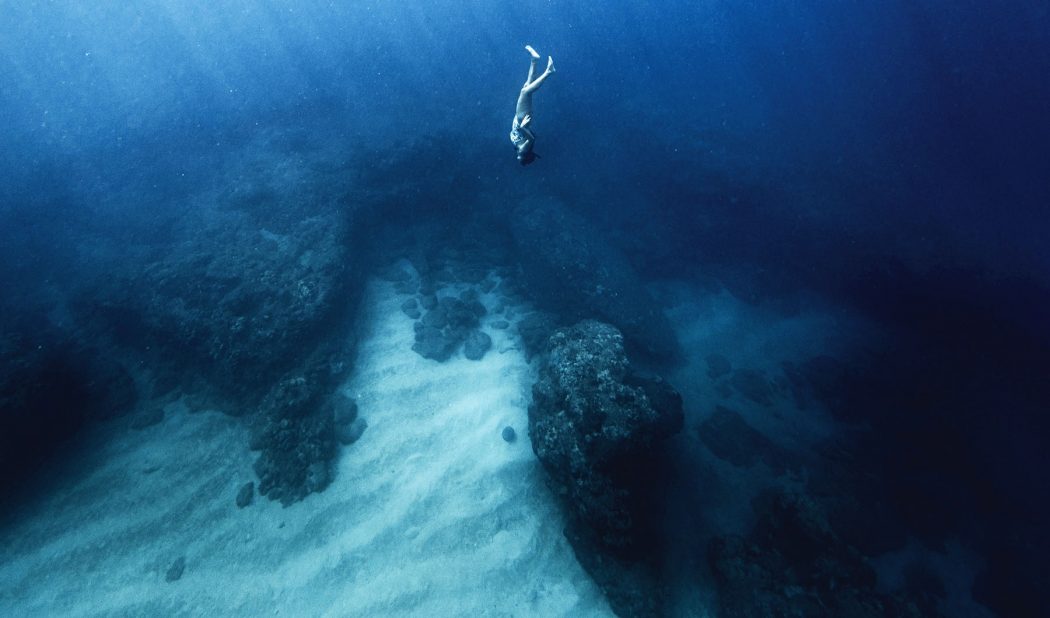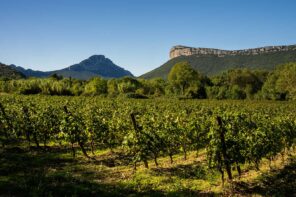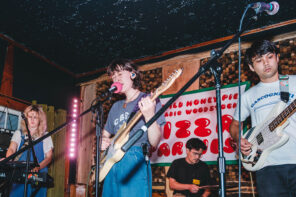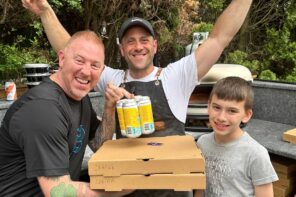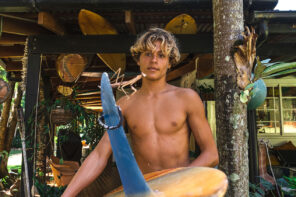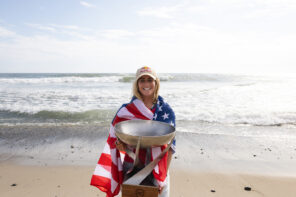There are women and then there are badass ocean women. These individuals embody the spirit of one of the most special natural resources we have available. After going through this interview feature (one of four), we hope you might consider taking the opportunity to learn more about each of these ladies and their efforts to better things they come in contact with, beyond what we can share in each individual interview.
To bring this to life, we did what any good lover of the ocean would likely do and got creative. For that, we asked these ladies to seek out and interview another sister of the sea. Badass ocean women interviewing badass ocean women. We are pleased and honored to be able to share the first installment of this interview series, featuring legendary spearfisherwoman + shark whisperer, Kimi Werner.
How did you originally become interested in diving and when did you start?
I grew up on the island of Maui, and when I was really young, my family was quite poor. My parents worked really hard but didn’t make a lot of money at the time. My dad used freediving and spearfishing to literally put food on the table.
When I was about 5 years old, he decided to let me come with him. He tried to tow me along on a boogie board, but I kept hopping off the board and into the water. I loved it. I felt like I was in a world where I could fly and everything was so beautiful. I also loved putting in my order for my favorite dinners and watching my dad go down to the bottom of the ocean and return them just for me. This is when my love for freediving and spearfishing started, but I didn’t learn to hunt on my own until I was 24 years old.
When I was about 7 years old, my parents started making more money and we moved from that little shack in Haiku, Maui to a normal subdivision. We also stopped having to depend on the ocean to feed us directly and started buying more food from stores and restaurants. It wasn’t until I was an adult, working in the restaurant industry myself, that I realized how disconnected and miserable I felt. I didn’t feel connected to nature or even the food I was cooking. The more I thought about it, the more I realized that my happiest days were when we were poor and living simply. That’s when I decided that I would return to my roots and learn to hunt.
How has a life spent in the ocean shaped your opinions and views? What is the biggest thing the ocean has taught you?
It’s really hard to choose just one lesson. The ocean has taught me so much. I suppose one of the most helpful lessons I’ve learned from the ocean is the power of observation and being present. When I’m underwater, I am 100 percent present, and that is the most amazing feeling in the world. I’m not anywhere else in my mind. All the chatter fades away, and I just observe what’s right in front of me.
At first, I just enjoyed this process because it felt so pure and cleansing, but the more I spent time being present in the ocean, I found that I actually started to develop natural instincts that I never realized I had. It’s almost like the more time I spent being present and observing, the more I learned things, both consciously and subconsciously.
…the more I spent time being present in the ocean, I found that I actually started to develop natural instincts that I never realized I had.
After a while, I found myself responding to situations without having to actually think, sometimes responding to situations before they even happened. That’s because I learned to read the signs around me and understand them on a deeper level. The noise in my brain is no longer there to distract or misguide me. Learning to apply this on land is definitely more difficult for me, but I do feel that it carries over.
How long can you hold your breath? How deep is your typical dive?
My longest breath hold was four minutes and 45 seconds, but for the most part, when hunting, I try to be really conservative. I’ll usually return for air around two minutes because there are so many variables when hunting in the ocean that could get me into trouble. My fish could have a strong fight, it could get tangled around a rock, there could be a big shark that startles me. There are so many things that could happen and use up my one breath of oxygen in a moment, so it’s always good to have reserves and not push it too much.
I usually feel pretty comfortable hunting in the 70 to 100 feet range, but my deepest dive (just swimming down on my own and back without using any lines to pull on or anchors to ride) was 159 feet. Once I used an anchor and rope and let myself dive and ride it down to 184 feet, but that was just for fun.
You seem to have little fear. You rode on the back of a not-so-small Great White. Has there ever been another time when you thought, “Wow, I’m outside my comfort zone”?
Oh, definitely. I feel out of my comfort zone a lot, and when I do, the first thing I do is assess what that fear/discomfort is based on. If it’s based on ego alone, I try to give myself love and compassion and dismiss it. If it’s based on my mind triggering alarms of panic, I try to get to a calm place and slow down the panicked thoughts and redirect that energy into an appropriate course of action.
If the fear ends up being an actual valid warning sign of danger, I take inventory on what I can do to reduce my percentages of harm. I dismiss any dangers or threats that I can’t control, and I focus on finding the answers to what can actually help me safely get what I want out of the situation. I wouldn’t say that I have little fear. I’d just say that I try my best to turn fear, stress, and discomfort into courage, productive energy and calmness while under pressure.
Keep up with Kimi on her Instagram (@kimi_swimmy) and website, www.kimiwerner.com. Thank you Kimi!

